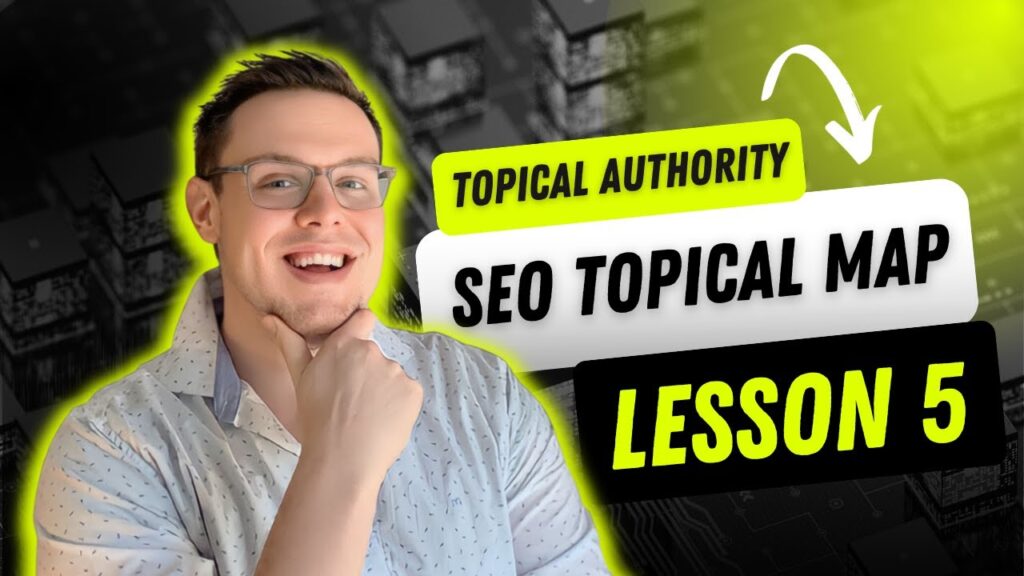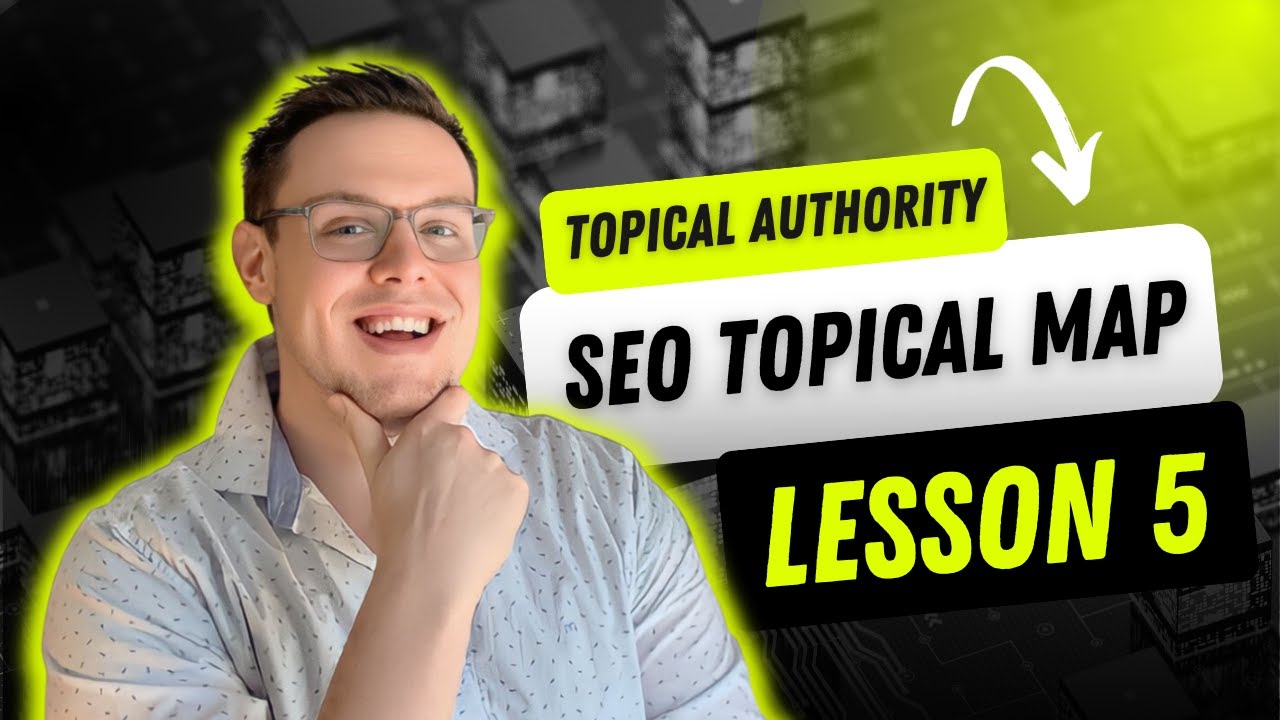Hello and welcome to lesson number five in our SEO Topical Maps course. My name is Marc Möller, and in this lesson, we will be focusing on building a topical map for a family law service. We will recap the previous lesson on exploring potential topics for maps and discuss the importance of determining the title for each folder in the map. Our goal is to achieve the lowest cost of retrieval for search engines, which means optimizing every page title, heading, paragraph, sentence, and image for search queries. We will also delve into analyzing competitors’ pages to find gaps and create better content, as well as the significance of passage ranking and providing specific answers to searchers’ questions. Join me in this video to learn more about creating high-quality, optimized content for your topical map.
Lesson Recap: Exploring Potential Topics for Maps
In the previous lesson, we discussed how to explore potential topics for your topical map. We learned about using resources like Wikipedia to gather information and build a topical map. In this lesson, we’ll focus on determining the title for each folder in the map, specifically for a family law service.
Building the Topical Map for a Family Law Service
Now that we have a basic understanding of how to explore potential topics for our topical map, let’s move on to building the actual map. For this lesson, we’ll be building a topical map for a family law service. We know that one of the main topics we want to cover is “divorce.” So, our goal is to determine the title for the folder related to divorce in our map.
Determining the Title for Each Folder in the Map
When it comes to determining the title for each folder in the map, it’s important to consider search engine optimization (SEO) factors. We want to achieve the lowest cost of retrieval possible for search engines, meaning it should be easier and cheaper for search engines to understand and serve our content. To achieve this, every page title, heading, paragraph, sentence, and image should be optimized for search queries.
The Goal of Achieving the Lowest Cost of Retrieval for Search Engines
By optimizing our content for search queries, we can achieve the lowest cost of retrieval for search engines. This means that search engines will find it easier and cheaper to understand and serve our content to users. To achieve this goal, we need to ensure that every element of our pages, including page titles, headings, paragraphs, sentences, and images, are all optimized for relevant search queries.
Optimizing Every Page Title, Heading, Paragraph, Sentence, and Image
To achieve the lowest cost of retrieval, it’s essential to optimize every element of our pages. This includes optimizing page titles, headings, paragraphs, sentences, and even images. By doing so, we can ensure that our content is highly relevant to search queries and increases the likelihood of ranking higher in search engine results.
Analyzing Competitors’ Pages to Find Gaps and Create Better Content
To stand out from competitors and create high-quality content, it’s crucial to analyze their pages and identify any gaps in their information. By conducting thorough competitor analysis, we can find opportunities to create content that is more valuable and comprehensive than what’s already available. By addressing these gaps and providing better content, we can increase the likelihood of ranking higher in search engine results.
Importance of Passage Ranking for Specific Answers
Passage ranking is an essential factor in providing specific answers to searchers’ questions. By optimizing our content using passage ranking techniques, we can ensure that search engines understand the specific answers our content provides. This is particularly important when it comes to addressing specific queries related to our topical map, such as the length of the divorce process in a specific location.
Standing Out with High-Quality Content Due to Google’s Limited Indexing
Google’s limited indexing capabilities mean that not all pages on the internet can be indexed and displayed in search results. This means that it’s crucial to stand out with high-quality content that demonstrates expertise and relevance. By providing valuable and well-optimized content, we increase the chances of our pages being indexed and ranked.
Aiming for Higher Quality Pages and Quality Score per Page
To achieve higher rankings, it’s important to aim for higher quality pages and a higher quality score per page. Google considers site-wide signals when assessing the quality of a website, meaning that one or two poorly performing pages can negatively impact the rankings of the entire site. By focusing on creating better articles and improving the user experience, we can improve the quality score of our pages and increase overall rankings.
Balancing Depth and Width of Topical Coverage
When building our topical map, it’s crucial to find the right balance between depth and width of topical coverage. We want to cover both specific subtopics and the main topic comprehensively. While it’s important to provide in-depth coverage of specific subtopics, it’s also essential to cover the main topic and establish expertise on it. This balance ensures that our content is both highly relevant and comprehensive.
Choosing the Right Page Titles
Using Keyword Research
To choose the right page titles, keyword research is invaluable. By conducting keyword research, we can identify the most relevant and highly searched keywords related to our topical map. This research helps us understand what users are looking for and provides insights into the language and terms they use.
Using SEMrush Keyword Magic
A useful tool for conducting keyword research is SEMrush Keyword Magic. This tool allows us to enter a root keyword, such as “divorce,” and generate a list of related keywords and their search volume. By using SEMrush Keyword Magic, we can identify keywords that are both highly searched and relevant to our topical map.
Selecting High Search Volume and Competitive Keywords
When choosing page titles, it’s important to select keywords with high search volume and competition. High search volume indicates that there is significant user interest in the topic, increasing the potential for traffic to our pages. Additionally, selecting keywords with competition ensures that there is existing demand for the topic and that it’s worth investing time and resources in creating content for it.
Selecting Easy-to-Rank Keywords
While it’s important to target high search volume and competitive keywords, it’s also beneficial to select some easy-to-rank keywords. Easy-to-rank keywords are those with lower competition, making it easier for our pages to rank higher in search engine results. By including a mixture of both highly competitive and easy-to-rank keywords in our page titles, we can increase the chances of ranking well across a range of search queries.
Analyzing Search Engine Results Pages (SERPs)
Identifying Competitors and Gaps in the SERPs
Analyzing search engine results pages (SERPs) is a crucial step in understanding our competitors and identifying gaps in the market. By examining the websites and content that rank highly for our target keywords, we can gain insights into their strategies and identify opportunities to create better content. By addressing these gaps and providing more valuable information, we increase our chances of ranking higher in the SERPs.

Focusing on Relevant and Directly Connected Topics
Establishing Authority Through Relevant Topics
To establish authority in our niche, it’s essential to focus on relevant and directly connected topics. By providing comprehensive and well-researched content on these topics, we can demonstrate expertise and build trust with our audience. Focusing on relevant and directly connected topics allows us to establish ourselves as a reliable resource in our field.
Creating High-Quality, Useful Articles
Satisfying Competitive Search Queries
Creating high-quality and useful articles is essential to satisfy competitive search queries. By understanding the search intent behind specific queries and addressing them thoroughly in our content, we increase the likelihood of ranking higher in search engine results. By providing valuable and relevant information, we can attract and retain users’ attention, improving the overall user experience.
Considering Entity Attributes, Values, and Relationships
When creating content, it’s important to consider entity attributes, values, and relationships. By understanding the context in which certain topics or entities exist, we can create content that is more comprehensive and useful. This approach helps us provide a deeper understanding of the topics we cover and improves the overall quality of our articles.
Importance of Keyword Frequency and Other Technologies
Keyword Frequency in the Beginning
Keyword frequency plays a significant role in the optimization process, particularly in the beginning stages. By strategically using relevant keywords throughout our content, we demonstrate to search engines that our pages are highly relevant to specific search queries. However, it’s important to note that keyword frequency alone is not enough. Other technologies, such as passage ranking, also come into play later on.
Role of Passage Ranking
Passage ranking is an important technology employed by search engines. It allows them to understand and rank individual passages of our content, even if they are not the main focus of the page. By optimizing our content for passage ranking, we can provide specific answers to searchers’ questions and increase our chances of ranking in relevant search queries.
In conclusion, lesson number five of the SEO Topical Maps course by Marc Möller has provided valuable insights into selecting the right page titles, analyzing search engine results pages, focusing on relevant topics, creating high-quality content, and understanding the importance of keyword frequency and other technologies. By following these strategies and techniques, we can optimize our content for search engines, improve our rankings, and establish ourselves as authorities in our field.
